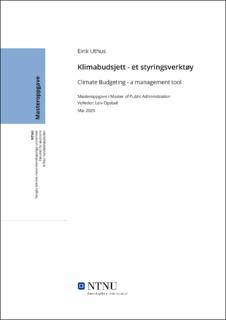Klimabudsjett - et styringsverktøy
Master thesis
Permanent lenke
https://hdl.handle.net/11250/2777142Utgivelsesdato
2020Metadata
Vis full innførselSamlinger
- NTNU Handelshøyskolen [1623]
Sammendrag
Flere av kommunene i Norge har valgt å innføre et klimabudsjett som en del i behandlingen av deres ordinære budsjett. Denne oppgaven har valgt å se nærmere på hva et klimabudsjett egentlig er. Dette er gjort ved å ta utgangspunkt i de fire mest folkerike byene i Norge, Oslo, Bergen, Trondheim og Stavanger, og se på deres bruk av klimabudsjetter og prøvd å finne svaret på forskningsspørsmålene:
Hva er et klimabudsjett? Hvordan brukes klimabudsjettet i kommunene?Hva oppnår kommunen med bruken av klimabudsjettet?
Med utgangspunkt i teori knyttet til hvordan et budsjett virker og mål- og resultatstyring som styringsverktøy, så har denne oppgaven forsøkt å i større grad forstå hvordan et klimabudsjett virker. Dette er forsøkt belyst gjennom et kvalitativt forskningsdesign hvor intervjuer og dokumentstudier har vært innsamlingsmetoden. Denne studien har da sett nærmere på klimabudsjettene til de fire mest folkerike kommunene i Norge og vært i samtaler med de som jobber med det i de byene.
I denne oppgaven er det gjort tre hovedfunn: 1) Det er en samlet forståelse i de undersøkte byene om hva et klimabudsjett bør være: Et styringsverktøy for å styre klimagassutslippene i kommunen gjennom å ha styring av tiltak for å nå kommunens mål for kutt i klimagassutslipp.
2) De fleste av byene, som er undersøkt har ikke helt tatt i bruk styringsfunksjonen som de har tenkt å ilegge klimabudsjettet i dag, men alle jobber med å få det til budsjett 2021. Bare en av byene som er undersøkt, bruker også klimabudsjettet som et styringsverktøy.
3) Med de klimabudsjettene som har væt brukt så langt, har alle oppnådd at de får ut informasjon om hva som må til for å få klimagassutslippene ned og fokus på klimaarbeidet i kommunen. Several of the municipalities in Norway have chosen to input a climate budget in the process of their ordinary budget. This thesis has chosen to examine closer what a climate budget really is. This is done by looking at the four most populated cities in Norway, Oslo, Bergen, Trondheim and Stavanger, and examine their use of climate budgeting to find the answers to the following research questions:
What is a climate budget?How does the municipalities use their climate budget? What does the municipalities gain with their use of a climate budget?
With the basis of theory connected to how a budget works and management by objectives and results as a management tool, this thesis have tried to understand how a climate budget works. This is conducted with a qualitative study, where interviews and document studies have been the method for collecting data. This study has taken a closer look at the climate budgets of the four most populated municipalities in Norway, and had conversations with the people that work with the topic in those cities.
This thesis has had three main findings:1) There is a collected understanding in the researched cities of what a climate budget should be: A management tool to manage control of the greenhouse gas emissions in the municipality, through management of measures to reach the municipality’s goals for cutting the greenhouse gas emission.
2) Most of the cities that are researched, have not really used the management function that they have planned to put into the climate budget so far. But everyone is working to get that done by the 2021 budget. Only one of the researched cities uses the climate budget as a management tool.
3) With today’s climate budgets, everyone has achieved an output of information on what is needed to reduce the greenhouse gas emissions and a focus on the work that the municipality does on climate change.
